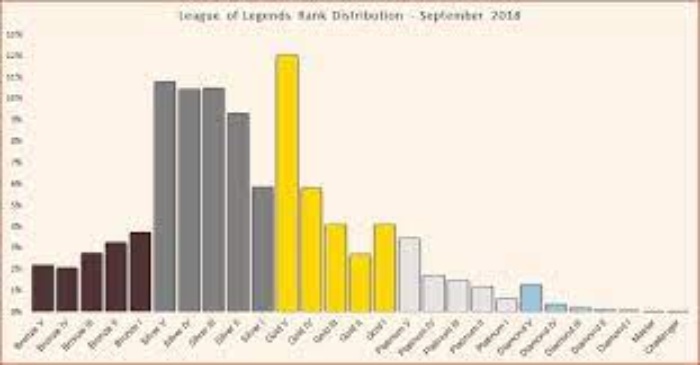League Of Legends Rank Distribution
The most popular PC game of any and all time is without a doubt League of Legends. Because of the tactical gameplay and wide range of champions available in MOBAs, each game has a different set of challenges. However, in competitive gaming, you must distinguish between the Challengers and the scum. The solution is indeed the League of Legends rating system, which assigns a tier and section based on skill and performance to the billions of LoL players worldwide.
Newcomers to competitive League of Legends, on the other hand, may find it intimidating. Many individuals are curious about things like how many ranks there are, what they’re named, and where they’ll start off. We’ve put together a list of commonly asked questions regarding the League of Legends rating system to help ease your transfer into the competitive realm of LoL. League of Legends’ player rank distribution and percentages by tier. The total number of players across all regions is taken into account. Only information from a single queue.
League Of Legends (LOL) Player Rankings
Riot’s API has given us access to accurate data on the distribution of players per tier. Several websites collect and exchange this information; after analyzing the most trustworthy ones, I came to the conclusion that their tools are almost identical. The recent upgrade of the servers and associated services may have caused minor percentage gaps, so keep an eye out for them. Even a difference of 30 minutes may cause a significant difference. Stats are based on rankings in a single queue alone and do not include any other areas.
It’s easy to observe that Silver and Gold are the most popular levels of League of Legends (LoL) gaming. The amount of players inside the highest tiers drastically decreases after Diamond, with just 0.012 percent of players making it to Challenger level and staying there. Riot’s own estimate of 8 million daily players leads us to believe that just around 1,500 players are talented enough to get into the top tier worldwide. It’s also important to remember that, starting with Platinum, players who have inactive ranked accounts lose LP over time. This means that if you want to maintain your high rating, you must keep playing.
Read More: Most Strongest DC Character
League Of Legends Ranking Explained
In every other sport, you’ll be pitted against someone whose abilities are similar to yours. You both qualify for the same event due to your similar skill sets, or in pro sports, you play against other people or teams that have also gained their right to be your opponents as well. League of Legends has a rating system because it believes other e-games should follow suit. In contrast to having an experienced player take on a newcomer or an introduction player instantly outsmarted by a long-term League of Legends champ, the ranking system enables players of similar quality to compete against one another.
The main event takes place in the Challenger Tier. The top-ranking League teams in each area are included in this ranking, which includes both established professionals and up-and-and-coming players. By making it to Challenger, an athlete puts himself on the map, and if a team is in need of a sub or a replacement, they may find someone here. There are only 50 places available in Challenger, where ranked teams are treated as single players. Master and GrandMaster, on the other hand, provide a more substantial training ground for prospective professional teams. The Master & newly introduced GrandMaster Tiers have benefited greatly from Riot’s ongoing changes to the professional environment. As the news is dominated by professional shakeups and retirements, fans may start turning to Master and GrandMaster to discover their next favorite professional player.
LoL’s Ranking Distribution
League of Legends seasons last one year, from January through November or December of the following year. League of Legends publishes the tier-by-tier ranking distribution prior to the start of each season. The solo game allocation has been revised and is now as follows:
- Iron: 7.1%
- Bronze: 22%
- Silver: 35%
- Gold: 23%
- Platinum: 7.9%
- Diamond: 2.5%
- Master: .032%
- GrandMaster: .040%
- Challenger: .017%
Every year, the distribution is almost the same, and the vast majority of participants are assigned to one of three levels: Bronze, Silver, or Gold.
Read More: How To Do Boomerang On Snapchat
Figures And Abstract
Self-reported video game expertise and extensive video game training have been the main sources of research on the cognitive impacts of action video gaming. Only a few research have looked at how good the participants were at gaming in order to draw any conclusions. However, it is yet to be shown if top players have greater executive control than ordinary players. Researchers used League of Legends gamers with the highest and lowest worldwide rankings to test three different elements of executive function: learning preferences, interruption control, & impulsive control. Since elite players and ordinary players had comparable years and hours of play each week, we controlled their self-reported gaming experience. In a Stroop-switching test, elite players had lower task-switching costs and lower response-congruency effects than ordinary players. Top players outperformed ordinary ones in an ongoing performance test, with greater hit levels and reduced false alarm rates. In the setting of task-switching, these results indicate that elite players have more cognitive flexibility and control of interruption. Additionally, elite players have superior impulse control than the average player. Researchers found a link between gaming skills and cognitive capacities rather than game-playing experience, which may clarify why earlier research on self-reported gameplay experience and those evaluating guided training or cognitive performance produced conflicting findings.
Read More: Gravity Falls Season 3 Release Date
Ranks Working In A League Of Legends
League of Legends has a nine-tiered ranking system, with the lowest tier (four) and the highest tier (one) being the highest. As your team wins more games, you get League Points (LP), which advance you through the divisions and tiers. A person’s Matchmaking Rating determines how many points they get (MMR). The more LP you get by beating a team with a greater MMR than your own, the better off you’ll be in the long run. You may also lose LP if you angrily leave a game or fail to win it. Once again, the LP you lose is determined by your and your opponent’s MMR. Your division and tier will be set as your actual rank at the conclusion of each rated season. As a result, you’ll get in-game prizes like unique skins at the conclusion of each season. As you go through the tiers, your price-quality and quantity will improve. Season 11, the most recent ranking season, began on January 8th, 2021. Every three months, the seasons are separated into three halves, each lasting three months.
Follow techr.org for the Latest Technology Update and news.






